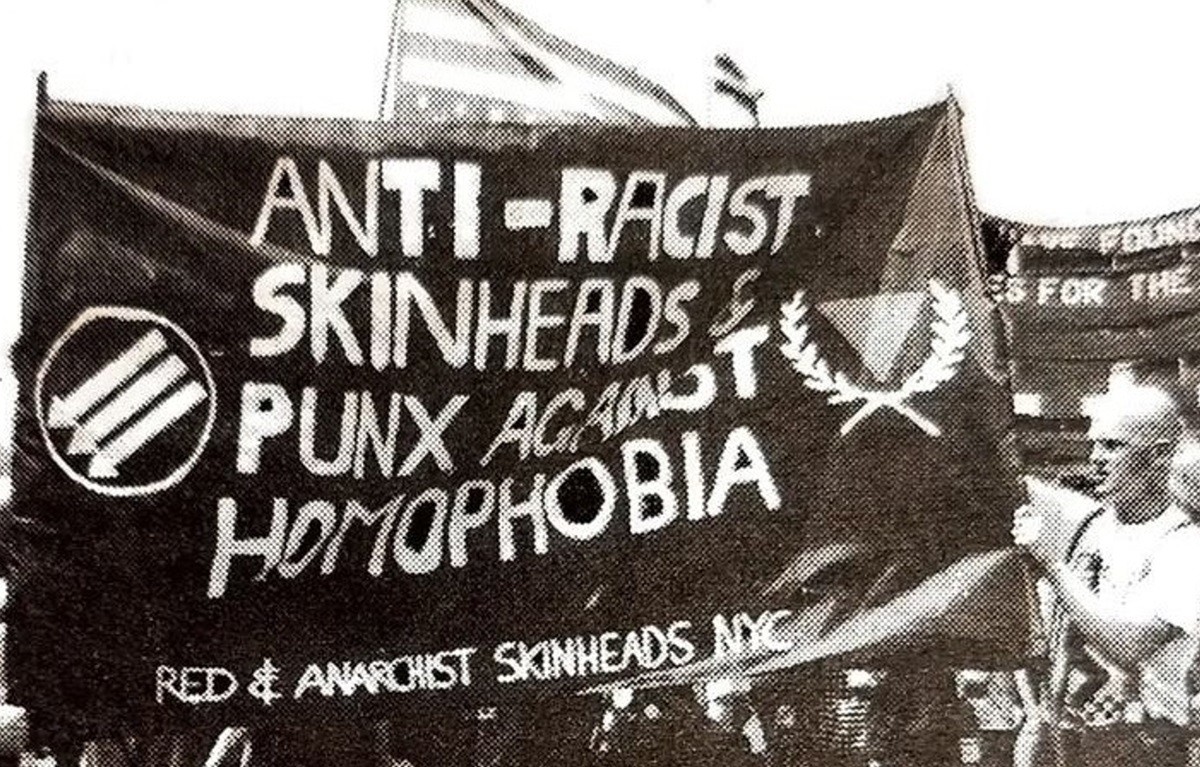Filed under: Analysis, Anarchist Movement, Anti-Patriarchy, History, Queer, Trans, US

Anarchist historian Spencer Beswick looks back on the intersection of queerness and anarchism within the past 40 years.
Anarchists grappled with the intersection of queerness and anarchism as part of a broader transformation of the US anarchist movement in the 1980s-1990s. Against gay assimilationism on one side and class reductionism on the other, radicals began to promote a specifically queer anarchist approach within anarchist and queer movements. This article offers a glimpse of queer anarchism in the Love and Rage Revolutionary Anarchist Federation, which was active throughout North America from 1989-1998.
Many of the most active Love and Ragers were themselves queer and advocated revolutionary politics within broader queer social movements. Members consciously spread new analysis, tactics, and values that had been developed within the anarchist movement. For example, Jan K. described in a report back in Love and Rage’s newspaper how a small group of anarchists brought a militant edge to a 1990 rally commemorating the Stonewall uprising. They dressed in black bloc and brought a banner to the rally that provided direction for an otherwise disorganized crowd. Jan related how “what had been a[n] unorganized mass of people outside a bar … turned into a spirited march behind a ‘Queer Without Fear—Autonomous Anarchist Action’ banner.” This exemplified how Love and Rage encouraged social movements to take a more organized and confrontational approach.
In this vein, another Love and Rager Liz H. advocated collective participation in the 1993 Queer March on Washington, arguing that “it is important that anarchists have a presence in the march to let people know that we cannot rely on laws and the government to guarantee queer liberation.” Anarchist chants at this march included “We’re fucking anarchists, we’ll fuck whoever we want!” and “We’re here, we’re Queer, and we hate the government!” A group of Red & Anarchist Skinheads marched with a banner reading “Anti-Racist Skinheads and Punx Against Homophobia” and chanted “Oi! Oi! Oi! We fuck boys!”
It is unclear, however, whether this attempt to insert radical politics into the 1993 Queer March on Washington was a success. Indeed, the overriding political direction of the march was relatively conservative. Critics argued that an elite leadership that was oriented towards mainstream Democratic Party politics steered the protest towards demands for assimilation and inclusion in the military rather than the everyday concerns of queer people (let alone a critique of imperialism)—an example of what Jasbir Puar would later term homonationalism.
Although anarchists articulated a critique of this orientation and offered a physical alternative in the anti-militarist black bloc, it was not widespread. In a broadsheet put out by QUASH (Queers United Against Straight-acting Homosexuals) called “Why I Hated the March on Washington,” they criticized the march for its militaristic politics, argued that “assimilation is killing us,” and called for a “queer united front” to challenge all forms of oppression and fight for revolutionary liberation.
Beyond activism in the streets, queer anarchists argued that there was something inherently queer about anarchism’s rejection of all structures of social domination. Liz H. noted about the anarchist contingent at the 1993 march that “Gay, Lesbian, Bi, hetero or undefined, all the anarchists were queer in their own way.” Lin E. went further, arguing in an article linking queer and Indigenous resistance that the “new activism of the 80s and 90s has already shown us the way. ACT UP and, more recently, Queer Nation, embody an unmistakably Queer perspective; non-hierarchical, even anarchical, they combine seriousness with humor, politics with play.”
This perspective prefigured later developments in queer anarchist theory. The Mary Nardini Gang argued in the 2014 zine “Toward the Queerest Insurrection” that queer is not simply a sexual identity but rather “the qualitative position of opposition to presentations of stability … Queer is the cohesion of everything in conflict with the heterosexual capitalist world. … By ‘queer’, we mean ‘social war.’ And when we speak of queer as a conflict with all domination, we mean it.”
In this view, anarchism is inherently queer because it rejects the “normalcy” of capitalist patriarchy and struggles against all forms of hierarchy and oppression. Political theorist AK Thompson argues that this is also expressed in a practical abolition of gender within black blocs. As traditional gender markers are consciously obscured, Thompson quotes one activist reflecting that each body becomes “nothing less and nothing more than one entity moving in the whole.” For these activists there is something queer in the bloc, something that produces a future beyond gender—perhaps akin to what Foucault called a new “economy of bodies and pleasures.” Here, then, is something we may call queer anarchism.
Spencer Beswick is an anarcho-historian and radical bookmonger. He is on Mastodon @spencerbeswick@kolektiva.social





